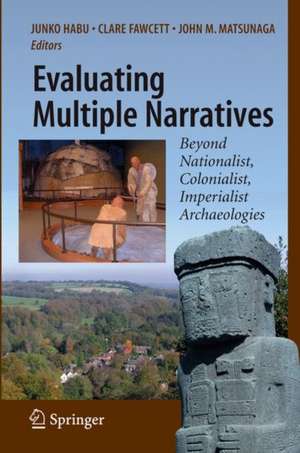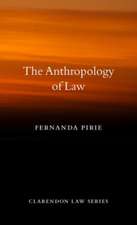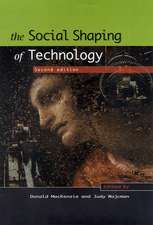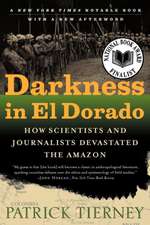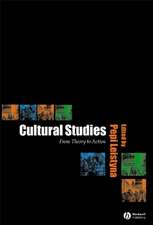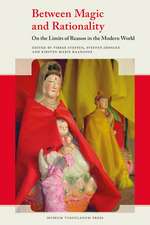Evaluating Multiple Narratives: Beyond Nationalist, Colonialist, Imperialist Archaeologies
Editat de Junko Habu, Clare Fawcett, John M. Matsunagaen Limba Engleză Paperback – 18 iul 2008
The goal of this volume is to use archaeological case studies from around the world to evaluate the implications of providing alternative interpretations of the past. These cases also address key questions such as: Can multivocality (multiple interpretations of the past) be separate from the theory of contemporary Anglo-American archaeology; is multivocality relevant to local residents and non-Anglo-American archaeologists; and can the close examination of alternative interpretations contribute to a deeper understanding of subjectivity and objectivity of archaeological interpretation?
The contributors are at the forefront of archaeological theory research and the commentators are eminent archaeological theoreticians. This volume will also contribute to the debate about the social and political implications of archaeological practice.
| Toate formatele și edițiile | Preț | Express |
|---|---|---|
| Paperback (1) | 384.48 lei 6-8 săpt. | |
| Springer – 18 iul 2008 | 384.48 lei 6-8 săpt. | |
| Hardback (1) | 391.79 lei 6-8 săpt. | |
| Springer – 12 oct 2007 | 391.79 lei 6-8 săpt. |
Preț: 384.48 lei
Nou
Puncte Express: 577
Preț estimativ în valută:
73.59€ • 79.97$ • 61.86£
73.59€ • 79.97$ • 61.86£
Carte tipărită la comandă
Livrare economică 21 aprilie-05 mai
Preluare comenzi: 021 569.72.76
Specificații
ISBN-13: 9780387764597
ISBN-10: 0387764593
Pagini: 217
Ilustrații: XII, 218 p.
Dimensiuni: 155 x 235 x 12 mm
Greutate: 0.33 kg
Ediția:2008
Editura: Springer
Colecția Springer
Locul publicării:New York, NY, United States
ISBN-10: 0387764593
Pagini: 217
Ilustrații: XII, 218 p.
Dimensiuni: 155 x 235 x 12 mm
Greutate: 0.33 kg
Ediția:2008
Editura: Springer
Colecția Springer
Locul publicării:New York, NY, United States
Public țintă
Professional/practitionerCuprins
Operationalizing Multivocality.- Introduction: Evaluating Multiple Narratives: Beyond Nationalist, Colonialist, Imperialist Archaeologies.- An Ethical Epistemology of Publicly Engaged Biocultural Research.- Multivocality and Indigenous Archaeologies.- Making a Home: Archaeologies of the Medieval English Village.- Critical Histories of Archaeological Practice: Latin American and North American Interpretations in a Honduran Context.- Paths of Power and Politics: Historical Narratives at the Bolivian Site of Tiwanaku.- Evaluating Multiple Narratives in Various Regional and Historical Settings.- Science or Narratives? Multiple Interpretations of the Sannai Maruyama Site, Japan.- Multivocality, Multifaceted Voices, and Korean Archaeology.- Virtual Viewpoints: Multivocality in the Marketed Past?.- Alternative States.- Irish Archaeology and the Recognition of Ethnic Difference in Viking Dublin.- Discussion.- “Alternative Archaeologies” in Historical Perspective.- Multivocality and Social Archaeology.- The Integrity of Narratives: Deliberative Practice, Pluralism, and Multivocality.
Textul de pe ultima copertă
Evaluating Multiple Narratives: Beyond Nationalist, Colonialist, Imperialist Archaeologies
Edited by Junko Habu, Clare Fawcett, and John M. Matsunaga
This volume uses Bruce Trigger's 1984 article, "Alternative Archaeologies: Nationalist, Colonialist, Imperialist" as a starting point to examine the complex interaction between contemporary society and archaeological practice today. It deals with the evaluation of multiple interpretations of the past, with a focus on the concept of multivocality. According to its practitioners and adherents, archaeological multivocality gives voice to underrepresented groups and individuals by providing alternative interpretations of the past.
This book uses case studies from Asia, Latin America, Europe and North America to explore the interplay between the sociopolitical context of specific national, regional or local archaeological traditions and the variety of interpretations of the past made by archaeologists and others. A key question asked throughout the book is whether multivocality, a concept derived from postmodern theory and embedded in the political, social and intellectual traditions of Britain and North America, is welcome or applicable in other parts of the world. The diversity of topics and geographical areas covered in the chapters allows readers to understand the dynamic nature of the relationship between archaeology, sociopolitical conditions, and peoples' identities in regional and historical settings.
The volume concludes with discussions by Alison Wylie, Ian Hodder, and Bruce Trigger who revisit past research but also look forward to the future of alternate archaeologies, multivocality and multiple narratives.
Edited by Junko Habu, Clare Fawcett, and John M. Matsunaga
This volume uses Bruce Trigger's 1984 article, "Alternative Archaeologies: Nationalist, Colonialist, Imperialist" as a starting point to examine the complex interaction between contemporary society and archaeological practice today. It deals with the evaluation of multiple interpretations of the past, with a focus on the concept of multivocality. According to its practitioners and adherents, archaeological multivocality gives voice to underrepresented groups and individuals by providing alternative interpretations of the past.
This book uses case studies from Asia, Latin America, Europe and North America to explore the interplay between the sociopolitical context of specific national, regional or local archaeological traditions and the variety of interpretations of the past made by archaeologists and others. A key question asked throughout the book is whether multivocality, a concept derived from postmodern theory and embedded in the political, social and intellectual traditions of Britain and North America, is welcome or applicable in other parts of the world. The diversity of topics and geographical areas covered in the chapters allows readers to understand the dynamic nature of the relationship between archaeology, sociopolitical conditions, and peoples' identities in regional and historical settings.
The volume concludes with discussions by Alison Wylie, Ian Hodder, and Bruce Trigger who revisit past research but also look forward to the future of alternate archaeologies, multivocality and multiple narratives.
Caracteristici
Presents case studies of previously under-research groups throughout the world Combines archaeological theory with practical, real-world examples Gives a voice to minority groups, whose stories were previously only told by their colonizers or the domininant culture Includes supplementary material: sn.pub/extras
